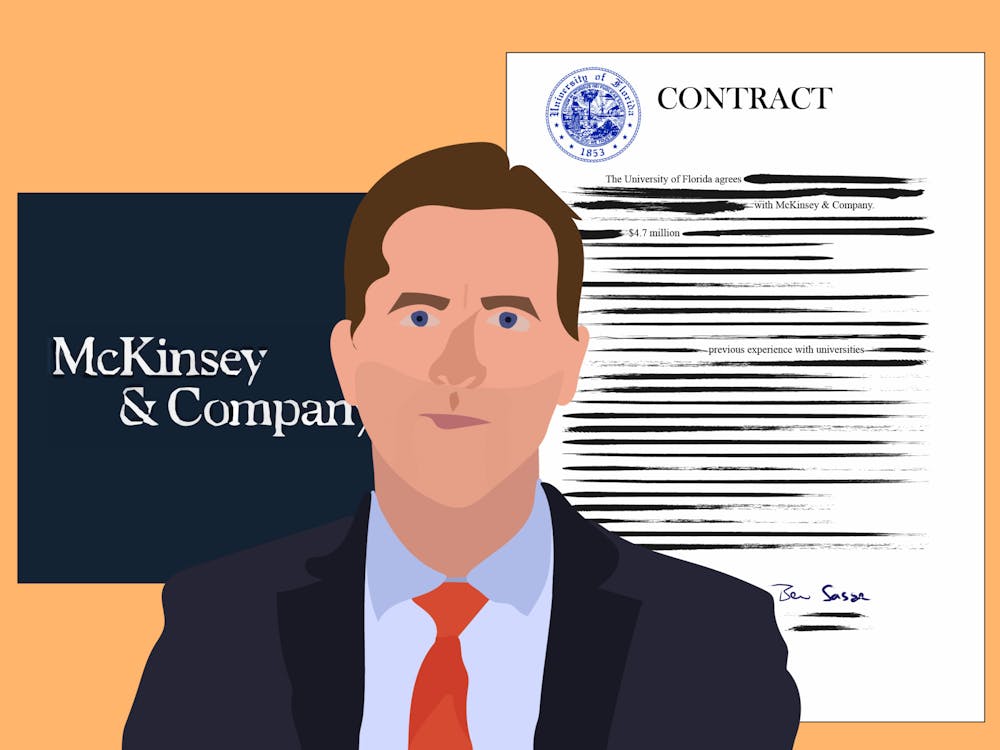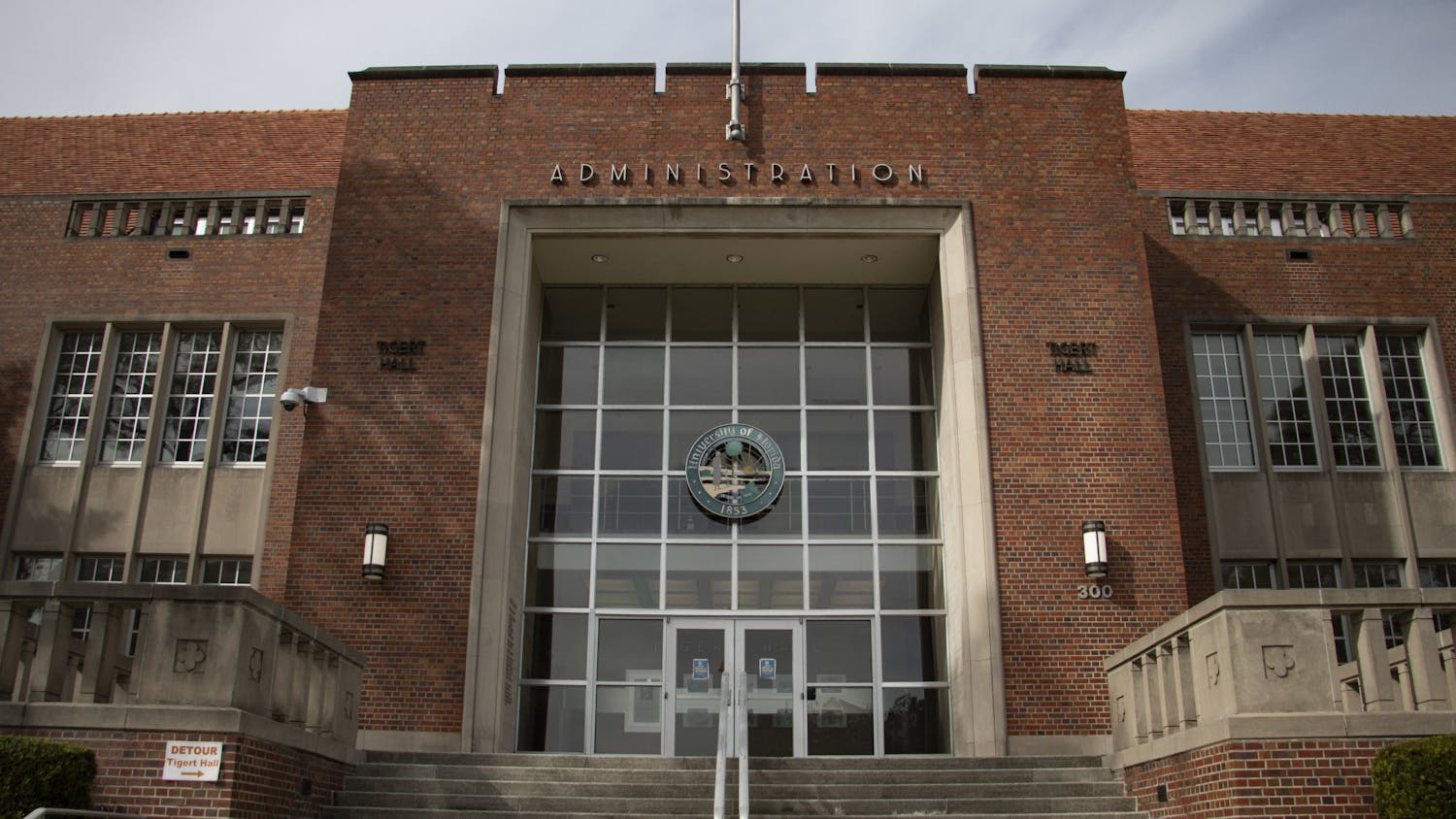UF President Ben Sasse hired McKinsey & Company, a global management consulting firm, on a $4.7 million contract to help develop the university’s vision for the future.
UF signed the McKinsey contract through a no-bid process in March, a month after Sasse took office as UF president.
The firm’s name carries prestige as one of the “big three” management consulting firms, with Boston Consulting Group and Bain and Company tailing McKinsey as direct competitors.
The firm employs more than 35,000 people who work across 67 countries as of 2022, according to an official McKinsey fact sheet.
UF Spokesperson Cynthia Roldan said McKinsey’s data-driven analysis of higher education provides a foundation to understand UF’s core strengths and big opportunities.
“They have helped stand up a best-in-class process for the new strategic plan that President Sasse and university stakeholders will be creating collaboratively beginning this semester,” Roldan wrote.
UF adopted an existing, competitively solicited contract with McKinsey through a government purchasing cooperative, a process frequently used by UF, Roldan said.
UF has paid $4.3 million to McKinsey as of July 19, according to invoices obtained from a public records request. While the contract will be paid in full by Aug. 31, it allows UF to request additional services until its termination date in February 2025.
Further details of McKinsey’s work at UF, including the names of the consultants working for the university, are unknown as of Aug. 22.
A public records request submitted by The Alligator for the “scope of work” attachment to the contract was denied under state public records laws as “trade secrets” and “business proprietary information.”
Additional requests for any materials McKinsey created under the contract, including presentations and reports, produced no responsive records.
The Arizona Republic encountered similar responses when reporting on the $14 million contract between McKinsey and the University of Arizona in 2019.
UA allowed the firm to redact entire pages of information the company considers proprietary, according to the Arizona Republic report.
“The redactions, allowable under state public records law, make it virtually impossible for an outsider to tell precisely what the firm did to earn its fees,” the Arizona Republic wrote.
Like Sasse, UA President Robert C. Robbins hired McKinsey shortly after taking office in 2017.
“It’s true they are very expensive,” Robbins told The Arizona Republic in 2019. “I would say it’s transforming the university in terms of giving us a roadmap to where the university will go in the next 10 to 15 years.”
UF administration holds a similar attitude toward McKinsey’s role in strategic planning.
“About half of all the big universities in the country have used McKinsey, including many of our public and private rankings competitors,” Roldan wrote in a statement. “And the other half wish they had.”
UF Faculty Senate Chair Danaya Wright said that while McKinsey’s report has not yet been made public, UF staff look forward to its results.
“To the extent faculty are to be held accountable, they look forward to engaging with the data McKinsey used in its strategic recommendations,” Wright said.
While the firm has a reputation as one of the best management consulting firms in the world, it has garnered controversy for its past contracts with pharmaceutical companies.
In 2021, McKinsey paid a total of $573 million to 47 different states to settle investigations related to its role in the “turbocharging” of opioid sales. Florida received $40 million from the settlement.
McKinsey’s simultaneous contracts with the FDA and opioid companies prompted the U.S. Senate to pass a bill that prevents conflicts of interest between companies who work for both private and public sector clients in December.
The firm also has a prestigious alumni network, including U.S. Secretary of Transportation Pete Buttigieg, Chelsea Clinton, Sen. Tom Cotton (R-AR) and Sasse himself.
While not present on the resume he submitted to the UF presidential search committee, Sasse cited McKinsey as a former employer on several occasions, including on his Senate campaign website.
He was never an employee and only served as a special adviser to the firm on an hourly contract, according to a New York Times report.
Roldan said Sasse’s prior involvement with McKinsey does not present a conflict of interest.
“President Sasse has no financial interest in McKinsey and hasn't worked for them in more than a decade,” she wrote.
UF has previously signed contracts with other consulting firms to aid in strategic planning and budget review.
Former UF Senior Vice President and Chief Operating Officer Charlie Lane, who was fired by Sasse in April, enlisted consultants from Boston-based firms Elkus Manfredi and DumontJanks in 2016 to help “shape the university and surrounding community’s future,” according to a UF website.
Lane and the consultants interviewed more than 200 UF and Gainesville community members and held public forums while developing their strategic plan for the university.
It is unclear if McKinsey has implemented similar community outreach practices in its contract with UF.
Michael Reid, dean for the UF College of Health and Human Performance, met with several McKinsey consultants on a Zoom call several months ago.
The consultants asked about management issues and operations of the college, Reid said.
“These were logical questions, and they listened carefully to my comments,” Reid said. “Happily, the interview was apolitical. There was no conversation about controversial issues.”
All UF deans were contacted for this article.
Deans for the colleges of journalism and communications, business and education say they have not met with McKinsey’s consultants as of Tuesday evening.
Contact Garrett at gshanley@alligator.org. Follow him on Twitter @garrettshanley.
Garrett Shanley is a fourth-year journalism major and the Spring 2025 university editor for The Alligator. Outside of the newsroom, you can find him watching Wong Kar-Wai movies and talking to his house plants.






